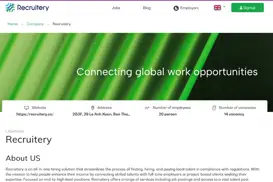A Complete Job Search Guide: How to Find the Right Job for You
Embarking on a job search journey can be daunting, particularly when the path is unclear. Dive into Aniday's succinct job search guide to find your ideal career fit.
What is the Job Search Process?

Job searching is the process of steps taken to secure a job. Though challenging, maintaining organization and focus is key to boosting your chances of success. The job search process can be broken down into the following stages:
-
Preparation: This stage involves self-assessment, research, and networking.
-
Application: This stage involves submitting your resume, cover letter, and other application materials.
-
Interview: This stage involves meeting with potential employers and discussing your qualifications.
-
Negotiation: This stage involves discussing salary and benefits with your potential employer.
-
Acceptance: This stage involves accepting a job offer and starting your new job.
Importance of a Job Search Guide
A job search guide is a valuable tool, offering organization, focus, and motivation for seekers. A comprehensive guide covers key steps, from self-assessment to post-interview follow-up.
A job search guide can help you in the following ways:
-
Stay on track: A job search is often lengthy and overwhelming. A guide keeps you focused on goals and ensures you're taking the necessary steps to find a job.
-
Avoid mistakes: Job seekers often make common errors. A guide helps you sidestep these pitfalls, boosting your chances of success.
-
Build confidence: With essential information and support, a job search guide empowers you to feel confident in your pursuit.
A step-by-step Job Search Guide
A step-by-step job search guide can help you navigate the process and increase your chances of success.
Step 1: Self-Assessment
-
Identify Skills: Conduct a thorough analysis of your strengths and weaknesses. Recognize areas of excellence and those needing improvement.
-
Clarifying Goals and Shaping Career Objectives: Clearly define your short-term and long-term career goals. This will serve as a roadmap, guiding your job search towards opportunities that align with your aspirations.
-
Evaluating Personal Values and Interests: Understand your values and interests, as they play a crucial role in determining job satisfaction. Aligning your career with your values enhances long-term professional fulfillment.
Step 2: Researching Industries and Companies
-
Exploring Different Industries: Dive into various industries to broaden your understanding of potential career paths. Identify industries that resonate with your skills and interests.
-
Identifying Target Companies: Compile a list of companies that align with your career goals. Research their missions, values, and workplace culture to ensure compatibility.
-
Gathering Information on Company Culture and Values: Gain insights into the culture and values of target companies. This knowledge will not only guide your application process but also help in preparing for interviews.
Step 3: Building Personal Brand

-
Developing a Strong Personal Profile: Craft a compelling resume that highlights your achievements, experiences, and skills. Tailor your resume to each application to make a lasting impression.
-
Crafting a Concise Elevator Pitch: Create a succinct and impactful elevator pitch that introduces yourself professionally. This tool is invaluable for networking events and initial job interviews.
-
Establishing an Online Presence (LinkedIn, Personal Website): Build a robust online presence on professional platforms like LinkedIn. Create a personal website if applicable, showcasing your portfolio and achievements.
Step 4: Networking
-
Utilizing Professional Networking Platforms: Leverage platforms such as LinkedIn to connect with professionals in your industry. Engage in meaningful conversations and seek advice.
-
Participating in Networking Events: Attend industry events, job fairs, and seminars to expand your network. Actively participate in discussions and exchange contact information for future collaboration.
-
Informational Interviews: Request informational interviews with professionals in your field of interest. This provides valuable insights and expands your network.
Step 5: Job Search Strategies

-
Online Job Boards and Recruitment Platforms: Explore popular job boards and recruitment platforms to identify suitable openings like Aniday, Upwork, Fiverr, etc. Customize your search based on location, industry, and job level.
-
Company Websites and Recruitment Pages: Regularly visit the career pages of target companies to stay updated on job opportunities. Many companies prefer candidates who show initiative by applying directly through their websites.
-
Recruitment Agencies and Candidate Searches: Register with reputable recruitment agencies that specialize in your industry. These agencies often have access to exclusive job opportunities.
Step 6: Application Process
-
Crafting In-Depth Cover Letters: Tailor each cover letter to the specific job you're applying for, emphasizing how your skills and experiences align with the company's needs.
-
Submitting Job Applications: Follow application instructions carefully and ensure all required documents are submitted. Pay attention to deadlines to demonstrate your commitment.
-
Following Up on Applications: After submitting applications, send a follow-up email expressing your continued interest. This demonstrates proactive engagement and enthusiasm for the position.
Step 7: Interview Preparation

-
Common Interview Questions and Responses: Prepare responses to common interview questions, highlighting your accomplishments and demonstrating how your skills align with the job requirements.
-
Behavioral Interviews: Learn behavioral interview techniques. Share specific examples from past experiences to highlight your problem-solving skills and abilities.
-
Mock Interviews and Feedback: Conduct mock interviews with friends or mentors to simulate real interview scenarios. Seek constructive feedback to refine your responses and improve your overall interview performance.
Step 8: Negotiating Job Offers
-
Researching and Evaluating Salary: Research industry standards and salary ranges for the position. Use this information to negotiate a fair and competitive salary.
-
Understanding Benefits and Perks: Carefully review the benefits package, considering health insurance, retirement plans, and other perks. Evaluate how these align with your personal and professional needs.
-
Negotiation Techniques: Develop negotiation skills to confidently discuss terms and reach a mutually beneficial agreement. Be assertive while maintaining a collaborative approach.
Step 9: Post-Interview Etiquette
-
Sending Thank-You Notes and Follow-Ups: Express gratitude by sending personalized thank-you emails after interviews. Reiterate your interest in the position and briefly reinforce why you are an ideal candidate.
-
Handling Multiple Job Offers: If faced with multiple job offers, carefully evaluate each opportunity based on your priorities and career goals. Communicate transparently with employers about your decision-making timeline.
-
Making Informed Decisions on Suitable Job Opportunities: Assess job offers holistically, considering not only compensation but also job responsibilities, growth opportunities, and alignment with your career aspirations.
Overcoming Challenges in the Job Search
The job search can be a challenging process, but with the right mindset and preparation, you can overcome any obstacle.
-
Handling Rejection: Rejections are stepping stones, not setbacks. Use them as opportunities for improvement. Seek feedback, refine your approach, and maintain resilience.
-
Addressing Employment Gaps: Be transparent about gaps and showcase proactive use of that time. Highlight freelance work, volunteering, or skill development to present a continuous commitment to growth.
-
Adapting to Industry Changes: Embrace change as an opportunity. Stay adaptable by updating skills, staying informed about trends, and showcasing your ability to navigate evolving industry landscapes.
Continuous Career Development

Lifelong Learning and Skill Enhancement: Enroll in relevant courses and certifications, emphasizing an unwavering commitment to ongoing education.
-
Monitoring Industry Trends: Stay informed about industry trends by actively following publications, thought leaders, and participating in conferences.
-
Networking for Career Growth: Leverage your network for mentorship, valuable advice, and potential career advancements, solidifying a comprehensive approach to sustained professional development.
* Here are some additional tips for success in your job search:
-
Stay Positive: Job searches can be discouraging, but remember, you possess skills and experience that employers seek.
-
Be flexible: Be willing to consider different types of jobs and locations.
-
Be persistent: Don't give up on your job search after a few setbacks. Keep applying for jobs and networking with people in your field.
Conclusion
Job hunting is challenging, but you're not alone. Follow Aniday's job search guide, increasing your chances of finding the right job. Best of luck in your search!
Aniday's HR Services
Headhunting Service
Find and recruit quality candidates in just 1 week! Supported by 40,000 experienced headhunters in IT, Finance, Marketing… capable of recruiting in any region.
Headhunting Service ➔Employer of Record (EOR) Service
On behalf of your business, we recruit employees and handle payroll without the need to establish a company in markets such as Vietnam, Singapore, Malaysia, India, Indonesia…
Employer of Record (EOR) Service ➔